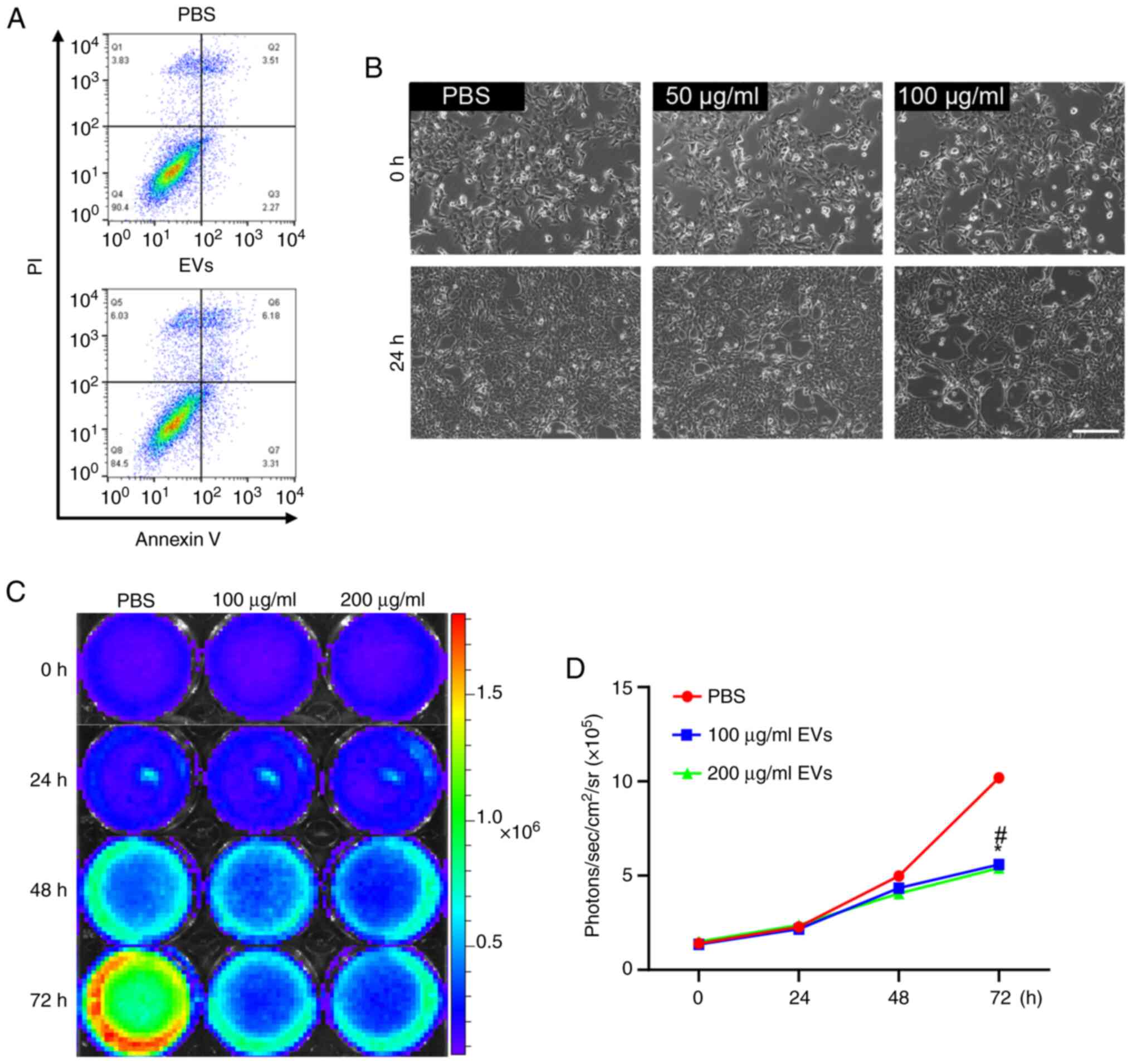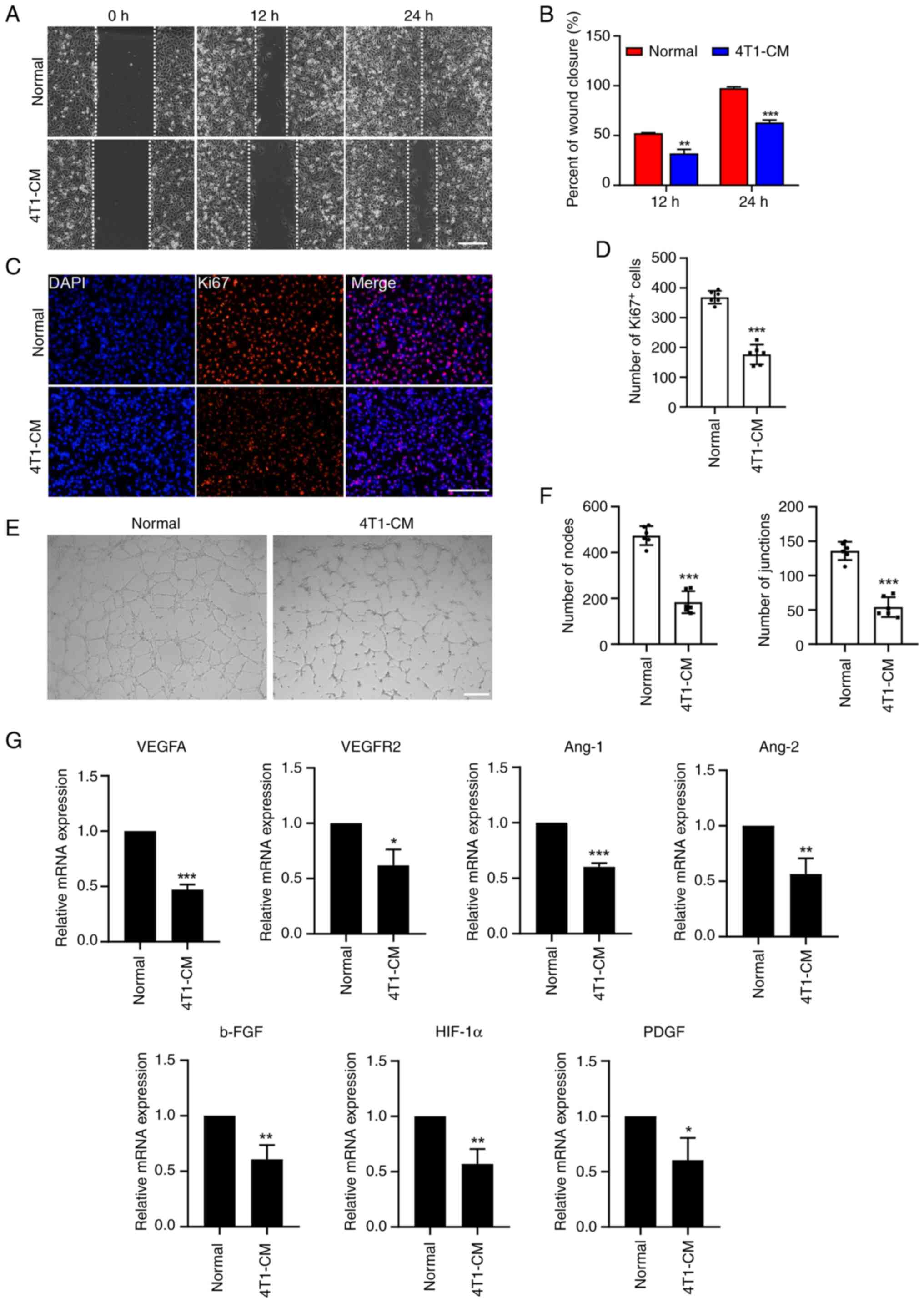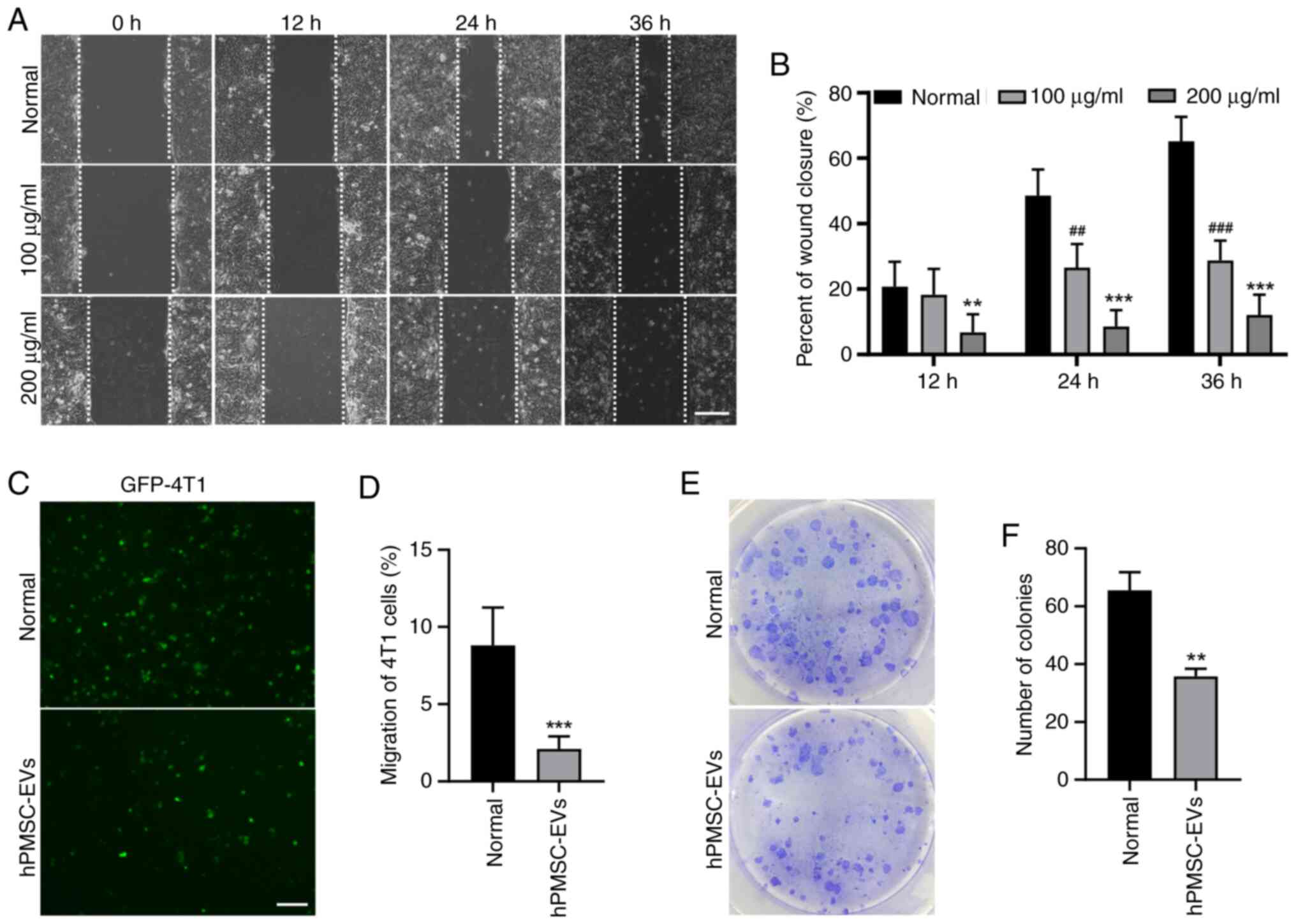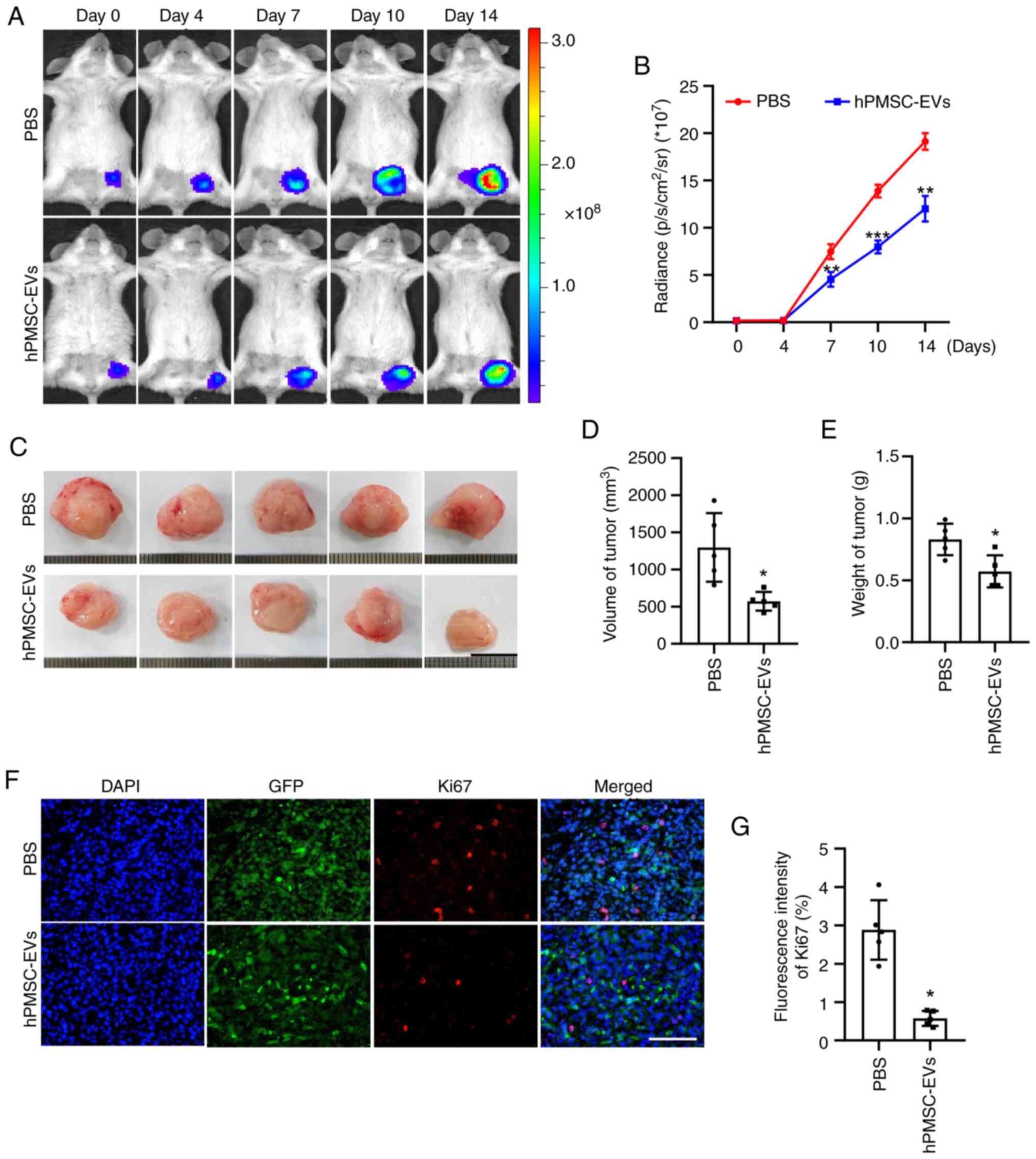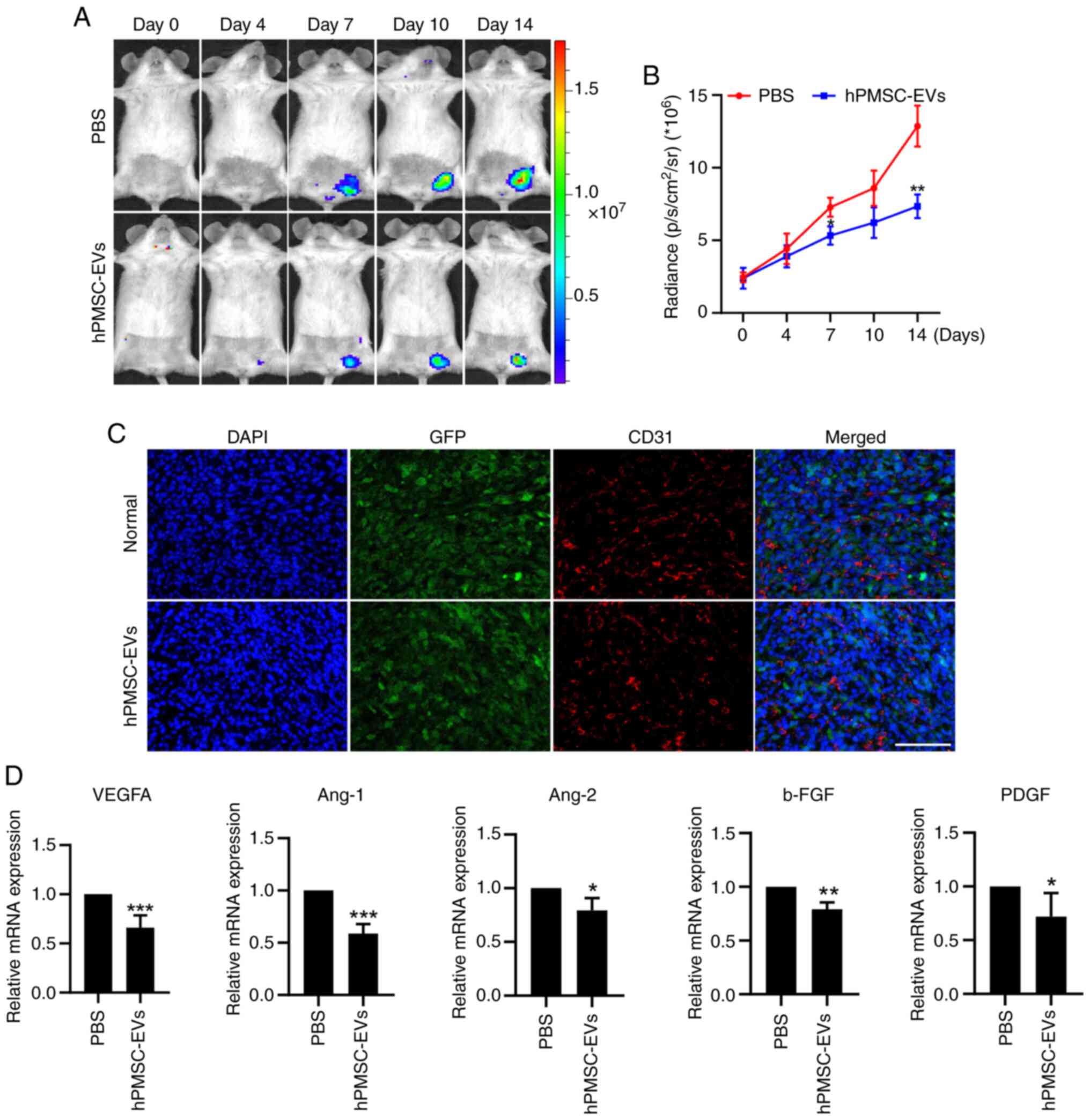|
1
|
Al-Awsi GRL, Alsaikhan F, Margiana R,
Ahmad I, Patra I, Najm MAA, Yasin G, Rasulova I, Hammid AT, Kzar
HH, et al: Shining the light on mesenchymal stem cell-derived
exosomes in breast cancer. Stem Cell Res Ther. 14:212023.
View Article : Google Scholar : PubMed/NCBI
|
|
2
|
Wan W, Miao Y, Niu Y, Zhu K, Ma Y, Pan M,
Ma B and Wei Q: Human umbilical cord mesenchymal stem cells
conditioned medium exerts anti-tumor effects on KGN cells in a cell
density-dependent manner through activation of the Hippo pathway.
Stem Cell Res Ther. 14:462023. View Article : Google Scholar : PubMed/NCBI
|
|
3
|
Bae J, Liu L, Moore C, Hsu E, Zhang A, Ren
Z, Sun Z, Wang X, Zhu J, Shen J, et al: IL-2 delivery by engineered
mesenchymal stem cells re-invigorates CD8+ T cells to
overcome immunotherapy resistance in cancer. Nat Cell Biol.
24:1754–1765. 2022. View Article : Google Scholar : PubMed/NCBI
|
|
4
|
Chen F, Zhong X, Dai Q, Li K, Zhang W,
Wang J, Zhao Y, Shen J, Xiao Z, Xing H and Li J: Human umbilical
cord MSC delivered-soluble TRAIL inhibits the proliferation and
promotes apoptosis of B-ALL cell in vitro and in vivo.
Pharmaceuticals (Basel). 15:13912022. View Article : Google Scholar : PubMed/NCBI
|
|
5
|
Zhou X, Zhang W, Liu Y, Zhang L and Li Z:
Chapter 5-Mesenchymal stem cells: A promising weapon for cancer
therapy. Zhang L, Han Z, Wang J, Li Z and Huang Q: Mesenchymal Stem
Cells. Academic Press; pp. 119–141. 2023, View Article : Google Scholar
|
|
6
|
Wang J, Ma Y, Long Y and Chen Y:
Extracellular vesicle derived from mesenchymal stem cells have
bidirectional effects on the development of lung cancer. Front
Oncol. 12:9148322022. View Article : Google Scholar : PubMed/NCBI
|
|
7
|
Eiro N, Fraile M, Fernández-Francos S,
Sánchez R, Costa LA and Vizoso FJ: Importance of the origin of
mesenchymal (stem) stromal cells in cancer biology: ‘Alliance’ or
‘war’ in intercellular signals. Cell Biosci. 11:1092021. View Article : Google Scholar : PubMed/NCBI
|
|
8
|
Ma Z, Xie W, Luo T, Hu Z, Hua J, Zhou J,
Yang T, Wang W, Song Z, Yu X, et al: Exosomes from TNF-α
preconditioned human umbilical cord mesenchymal stromal cells
inhibit the autophagy of acinar cells of severe acute pancreatitis
via shuttling bioactive metabolites. Cell Mol Life Sci. 80:2572023.
View Article : Google Scholar : PubMed/NCBI
|
|
9
|
Lee MW, Ryu S, Kim DS, Lee JW, Sung KW,
Koo HH and Yoo KH: Mesenchymal stem cells in suppression or
progression of hematologic malignancy: Current status and
challenges. Leukemia. 33:597–611. 2019. View Article : Google Scholar : PubMed/NCBI
|
|
10
|
Xia C, Wang T, Cheng H, Dong Y, Weng Q,
Sun G, Zhou P, Wang K, Liu X, Geng Y, et al: Mesenchymal stem cells
suppress leukemia via macrophage-mediated functional restoration of
bone marrow microenvironment. Leukemia. 34:2375–2383. 2020.
View Article : Google Scholar : PubMed/NCBI
|
|
11
|
Li R, Wang C, Zhou M, Liu Y, Chen S, Chai
Z, Huang H, Zhang K, Han Z, Hua G, et al: Heparan sulfate
proteoglycan-mediated internalization of extracellular vesicles
ameliorates liver fibrosis by targeting hepatic stellate cells.
Extracellul Vesicle. 1:1000182022. View Article : Google Scholar
|
|
12
|
Zhao J, Lin H and Huang K: Mesenchymal
stem cell-derived extracellular vesicles transmitting
MicroRNA-34a-5p suppress tumorigenesis of colorectal cancer through
c-MYC/DNMT3a/PTEN axis. Mol Neurobiol. 59:47–60. 2022. View Article : Google Scholar : PubMed/NCBI
|
|
13
|
You B, Jin C, Zhang J, Xu M, Xu W, Sun Z
and Qian H: MSC-derived extracellular vesicle-delivered L-PGDS
inhibit gastric cancer progression by suppressing cancer cell
stemness and STAT3 phosphorylation. Stem Cells Int.
2022:96682392022. View Article : Google Scholar : PubMed/NCBI
|
|
14
|
Yang S, Wang L, Gu L, Wang Z, Wang Y, Wang
J and Zhang Y: Mesenchymal stem cell-derived extracellular vesicles
alleviate cervical cancer by delivering microRNA-331-3p to reduce
LIM zinc finger domain containing 2 methylation in tumor cells. Hum
Mol Genet. 31:3829–3845. 2022. View Article : Google Scholar : PubMed/NCBI
|
|
15
|
Su W, Wang L, Zhou M, Liu Z, Hu S, Tong L,
Liu Y, Fan Y, Kong D, Zheng Y, et al: Human embryonic stem
cell-derived endothelial cells as cellular delivery vehicles for
treatment of metastatic breast cancer. Cell Transplant.
22:2079–2090. 2013. View Article : Google Scholar : PubMed/NCBI
|
|
16
|
Arnold M, Morgan E, Rumgay H, Mafra A,
Singh D, Laversanne M, Vignat J, Gralow JR, Cardoso F, Siesling S
and Soerjomataram I: Current and future burden of breast cancer:
Global statistics for 2020 and 2040. Breast. 66:15–23. 2022.
View Article : Google Scholar : PubMed/NCBI
|
|
17
|
Li Z and Han ZC: Introduction of perinatal
tissue-derived stem cells. Han ZC, Takahashi TA, Han Z and Li Z:
Perinatal Stem Cells: Biology, Manufacturing and Translational
Medicine. Singapore: Springer Singapore; pp. 1–7. 2019
|
|
18
|
Zhang K, Li R, Chen X, Yan H, Li H, Zhao
X, Huang H, Chen S, Liu Y, Wang K, et al: Renal endothelial
cell-targeted extracellular vesicles protect the kidney from
ischemic injury. Adv Sci (Weinh). 10:e22046262023. View Article : Google Scholar : PubMed/NCBI
|
|
19
|
Hezam K, Wang C, Fu E, Zhou M, Liu Y, Wang
H, Zhu L, Han Z, Han ZC, Chang Y and Li Z: Superior protective
effects of PGE2 priming mesenchymal stem cells against LPS-induced
acute lung injury (ALI) through macrophage immunomodulation. Stem
Cell Res Ther. 14:482023. View Article : Google Scholar : PubMed/NCBI
|
|
20
|
Jia P, Zhao X, Liu Y, Liu M, Zhang Q, Chen
S, Huang H, Jia Y, Chang Y, Chen S, et al: The RGD-modified
self-assembling D-form peptide hydrogel enhances the therapeutic
effects of mesenchymal stem cells (MSC) for hindlimb ischemia by
promoting angiogenesis. Chem Eng J. 450:1380042022. View Article : Google Scholar
|
|
21
|
Li H, Huang H, Chen X, Chen S, Yu L, Wang
C, Liu Y, Zhang K, Wu L, Han ZC, et al: The delivery of
hsa-miR-11401 by extracellular vesicles can relieve
doxorubicin-induced mesenchymal stem cell apoptosis. Stem Cell Res
Ther. 12:772021. View Article : Google Scholar : PubMed/NCBI
|
|
22
|
Zhang K, Zhao X, Chen X, Wei Y, Du W, Wang
Y, Liu L, Zhao W, Han Z, Kong D, et al: Enhanced therapeutic
effects of mesenchymal stem cell-derived exosomes with an
injectable hydrogel for hindlimb ischemia treatment. ACS Appl Mater
Interfaces. 10:30081–30091. 2018. View Article : Google Scholar : PubMed/NCBI
|
|
23
|
Wang C, Hezam K, Fu E, Pan K, Liu Y and Li
Z: In vivo tracking of mesenchymal stem cell dynamics and
therapeutics in LPS-induced acute lung injury models. Exp Cell Res.
437:1140132024. View Article : Google Scholar : PubMed/NCBI
|
|
24
|
National Research Council (US) Committee
for the Update of the Guide for the Care and Use of Laboratory
Animals, . The National Academies Collection: Reports funded by
National Institutes of Health. Guide for the Care and Use of
Laboratory Animals. 8th edition. Washington (DC): National
Academies Press (US). Copyright © 2011, National Academy of
Sciences. 2011, PubMed/NCBI
|
|
25
|
Zhou M, Wang L, Su W, Tong L, Liu Y, Fan
Y, Luo N, Zheng Y, Zhao H, Xiang R and Li Z: Assessment of
therapeutic efficacy of liposomal nanoparticles mediated gene
delivery by molecular imaging for cancer therapy. J Biomed
Nanotechnol. 8:742–750. 2012. View Article : Google Scholar : PubMed/NCBI
|
|
26
|
Livak KJ and Schmittgen TD: Analysis of
relative gene expression data using real-time quantitative PCR and
the 2(−Delta Delta C(T)) method. Methods. 25:402–408. 2001.
View Article : Google Scholar : PubMed/NCBI
|
|
27
|
Moradi-Chaleshtori M, Bandehpour M,
Heidari N, Mohammadi-Yeganeh S and Mahmoud Hashemi S:
Exosome-mediated miR-33 transfer induces M1 polarization in mouse
macrophages and exerts antitumor effect in 4T1 breast cancer cell
line. Int Immunopharmacol. 90:1071982021. View Article : Google Scholar : PubMed/NCBI
|
|
28
|
Wang M, Li J, Wang D, Xin Y and Liu Z: The
effects of mesenchymal stem cells on the chemotherapy of colorectal
cancer. Biomed Pharmacother. 160:1143732023. View Article : Google Scholar : PubMed/NCBI
|
|
29
|
Hong IS, Lee HY and Kang KS: Mesenchymal
stem cells and cancer: Friends or enemies? Mutat Res. 768:98–106.
2014. View Article : Google Scholar : PubMed/NCBI
|
|
30
|
Rahimi Tesiye M, Abrishami Kia Z and
Rajabi-Maham H: Mesenchymal stem cells and prostate cancer: A
concise review of therapeutic potentials and biological aspects.
Stem Cell Res. 63:1028642022. View Article : Google Scholar : PubMed/NCBI
|
|
31
|
Zhao Y, Shen M, Wu L, Yang H, Yao Y, Yang
Q, Du J, Liu L, Li Y and Bai Y: Stromal cells in the tumor
microenvironment: Accomplices of tumor progression? Cell Death Dis.
14:5872023. View Article : Google Scholar : PubMed/NCBI
|
|
32
|
Li T, Zhang C, Ding Y, Zhai W, Liu K, Bu
F, Tu T, Sun L, Zhu W, Zhou F, et al: Umbilical cord-derived
mesenchymal stem cells promote proliferation and migration in MCF-7
and MDA-MB-231 breast cancer cells through activation of the ERK
pathway. Oncol Rep. 34:1469–1477. 2015. View Article : Google Scholar : PubMed/NCBI
|
|
33
|
Du L, Tao X and Shen X: Human umbilical
cord mesenchymal stem cell-derived exosomes inhibit migration and
invasion of breast cancer cells via miR-21-5p/ZNF367 pathway.
Breast Cancer. 28:829–837. 2021. View Article : Google Scholar : PubMed/NCBI
|
|
34
|
Bailey AJM, Tieu A, Gupta M, Slobodian M,
Shorr R, Ramsay T, Rodriguez RA, Fergusson DA, Lalu MM and Allan
DS: Mesenchymal stromal cell-derived extracellular vesicles in
preclinical animal models of tumor growth: Systematic review and
meta-analysis. Stem Cell Rev Rep. 18:993–1006. 2022. View Article : Google Scholar : PubMed/NCBI
|
|
35
|
Aravindhan S, Ejam SS, Lafta MH, Markov A,
Yumashev AV and Ahmadi M: Mesenchymal stem cells and cancer
therapy: Insights into targeting the tumour vasculature. Cancer
Cell Int. 21:1582021. View Article : Google Scholar : PubMed/NCBI
|
|
36
|
Luo T, von der Ohe J and Hass R:
MSC-Derived extracellular vesicles in tumors and therapy. Cancers
(Basel). 13:52122021. View Article : Google Scholar : PubMed/NCBI
|
















